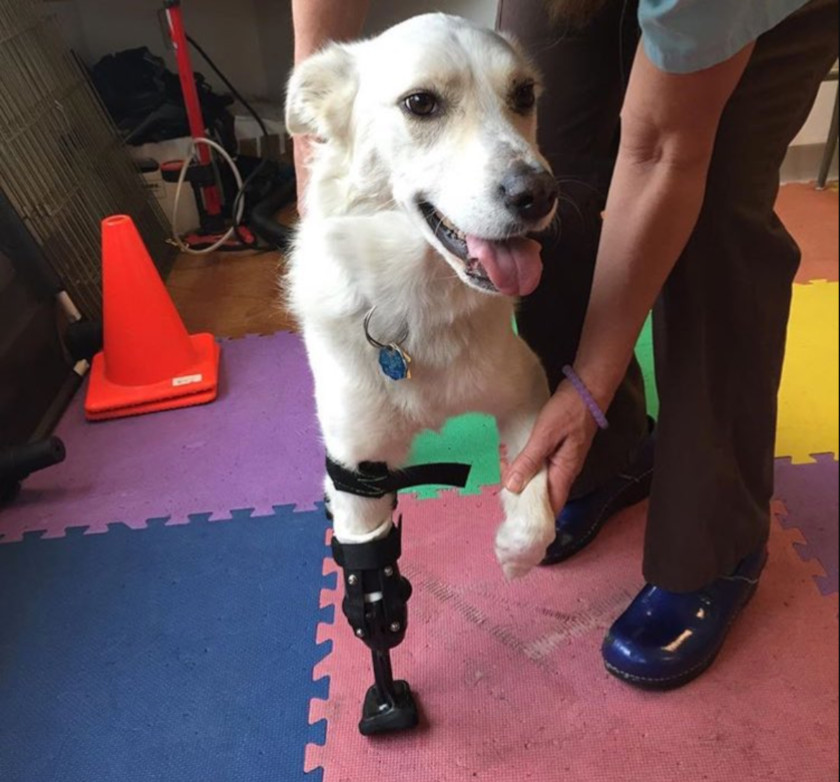Are dog prosthetics worth it? After all, we often hear about amputee pets getting prosthetics, but when do you hear about whether or not those artificial legs actually worked out for the dog and the parent? Now you can!

Three Colorado State University veterinarians wanted to find out if dog prosthetics are worth it so they reached out to pet parents of amputee dogs with prosthetics. Here are findings revealed in the first study of its kind that evaluated owner satisfaction with dog prosthetics.
Pet Parents Answer: Yes, Dog Prosthetics Are Worth It!
Titled “Retrospective Multi-Center Analysis of Canine Socket Prostheses for Partial Limbs,” this retrospective study surveyed pet parents who purchased prosthetic devices for their dogs within the last ten years. Dr. Wendland and her colleagues Drs. Felix Duerr and Bernard Seguin reached out to clients of OrthoPets, a leading animal prosthesis manufacturer from Denver, Colorado. Forty-seven pet parents responded to a survey that asked about:
- The length of the dog’s remaining limb
- If the dog had any kind of chronic disease like bone cancer
- How the prosthesis was used
- Whether or not the dog had rehabilitation therapy before or after prosthesis use
- How the dog used the prosthesis during activity
- What if any complications happened
- And whether or not the pet parent was happy with their investment.
The CSU vets also wanted to know how well the dog used the prosthetic for activities other than just walking. “Did they run with it? Did they jump with it? Do they dig? Can they lift another leg to go pee and stand on the prosthetic?” explained Dr. Theresa Wendland in our recent Tripawd Tuesday Facebook Live interview.
The Pros and Cons of Prosthetics for Dogs
“The long story short is overall, people were pretty happy with it, but there were a lot of difficulties along the way,” said Dr. Wendland. The most common pet prosthetic complications included minor skin sores and problems with how the fit prosthesis fit the dog.
The study findings are exciting, but it’s just a start. “It’s a little hard to fully understand the scope of all of that, when we are not directly involved with those patients,” Dr. Wendland explained. “It was retrospective, meaning looking back at old cases and then including that data instead of following it as it’s happening, which would be more of a prospective study,” she explained.
You can read the entire dog prosthetics study, but for now, the answer is yes, dog prosthetics are worth it. Here’s a synopsis of study findings:
Forty-six owners reported positive satisfaction; one was displeased.
Forty-five of 47 (95.7%) reported that in hindsight, they would choose this treatment option again.
Forty-two of 47 dogs were scored to have acceptable to full function
Five of 47 had unacceptable clinical function
62% had short-term complications. 19% had long-term complications. Skin sores were the most common short and long-term complication.
The more time a dog spent in the prosthesis, the better the clinical outcome scores and the higher the satisfaction rate of pet parents.
There was no correlation between the type of amputation (forelimb or rear) and length of residual limb, with either owner satisfaction or clinical outcome.
The Exciting Future of Pet Prosthetics for Tripawds

These are exciting times for Tripawds. Veterinary researchers now understand that yes, dog and cats can do great on three legs, but it comes at a price over time and we need to fix that. “Such gait alterations may have deleterious effects on long-term musculoskeletal health and lead to other quality of life issues,” Drs. Wendland, Duerr and Seguin write. A prosthesis has the possibility to minimize the physical cost of living life on three.
In the meantime, the pet prosthetics field is in its infancy with many unanswered questions, such as:
- Exactly how much leg needs to remain in order for a prosthetic to be successful?
- Do younger dogs do better than older dogs with prosthetics?
- Does the frequency of use have an impact on prosthetic success?
- How does rehabilitation help dogs adapt to prosthetics?
The good news is that right now, even in the early stages of the field, pet parents who have opted for a pet prosthetic for their Tripawd say that yes, pet prosthetics are worth it!
Recommended Reading
Tripawd Tuesday: Bridget’s Partial Amputation and Prosthetic, Part 1
Our 5 year old Golden Komo (Komoisgolden on Instagram) has been a right front amputee Tripaw since shortly after birth, and to further drive our inquiry, an ulna-ectomy was preformed within his first year (approximately) leaving him with only the radius to support his entire front torso.
He has no issues with stairs, running, or pestering his older sister Rose (TheDailyRoseKC) also on instagram. We have limited his downward jumping off the couch and bed etc. to limit the downward pressure on his left front limb.
Our great concern as he ages is his radius will weaken and break and leave him without mobility.
We’re very interested in your thoughts and findings with both your findings and with the limited information I have provides in my effort to be brief and respectful of your time.
The Instagram reference is not for self promotion, but to allow you more visual information should you wish to investigate further.
Additionally should you request an examination of our little man we do make frequent trips from Kansas City to Loveland and would only need the ability to schedule a month or so in advance.
Thank you in advance.
Derek
Hi Derek. Thanks for commenting, but only CSU can give you accurate information. Please contact CSU’s orthopedic team directly to have them assess your dog’s ability to use a prosthetic device.
My puppy Kai is getting her left hind leg amputated above the knee after 2 failed TPLO luxating patella surgeries and tearing 2 ligaments. She’s having the weirdest complications and we have decided that after her spending 10 of her 18 months alive on restrictions, in recovery or waiting for surgery, amputation is our best bet for her to live a normal life.
What’s the best option? She’s used to not bearing weight on her leg because of the knee issues, but I’m worried about chronic sores because she wouldn’t want to use the prosthetic then. What’s the difference in movement and everyday life when between and prosthetic versus a wheelchair?
Taylor, please join us in the Forums so our community can help you and Kai. I have some thoughts for you but would like to share them in the Forums so that others can learn too. Thanks, and see you there!
Hi I have a terrier with a front leg amputated. Where would I go for advice and price for a prosthetic leg thank you
Barbara, it’s best to locate an orthopedic veterinary surgeon in your area who has experience with prosthetics for dogs. If you cannot find one reach out to OrthoPets and they can point you to someone.
I’m very interested in prosthetics, my 7 year old Rottweiler just had a full shoulder amputation for bone cancer. Not even 48 hours post op she is herself hobbling around with help of a sling to go out to the bathroom. In a month when she is healed I really want her to be able go back to getting active again.
Glad to hear she’s doing well! Yay! Join us in the Forums to keep us posted. Meanwhile you will want to watch this space for a two-part series on prosthetics and Tripawds!